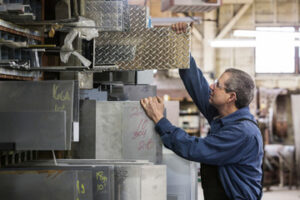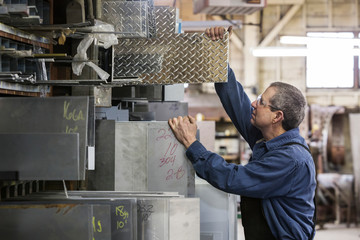Fabrication shops build up and machine down, with a range of services for projects from simple brackets to complex enclosures. Choosing the right shop for your project affects price, lead time, and product quality.
Shops fit into a broad manufacturing sphere, including precision sheet metal, specialty fab, and heavy plate. The key factors are technical skills, customer service, and production tools. Keep reading the article below to learn more about Custom Fabrication Shops.
Whether they’re creating intricate architectural elements, durable automotive parts, or precision electronic enclosures, custom fabrication shops use design to bring their customers’ products to life. From engineering designs to CAD drawings to prototypes and then into production, fabricators can provide a complete turnkey service that can take your concept from idea to finished product.
Using the same shop for both prototyping and production is ideal, particularly when it comes to sheet metal work. This will reduce the chance of errors that can happen when information is transferred from one location to another, such as miscommunication or confusion about specifications and requirements. A full-service fabrication shop will also be able to provide a consistent process for both cutting and welding, which can eliminate the need for multiple steps in the manufacturing process, saving time and money while maintaining quality and accuracy.
A full-service fabrication shop should also be able to offer priority scheduling when needed, particularly for rush jobs. This can help avoid the costly delays that may occur when it is necessary to delay production, and should result in the ability to meet deadlines that might otherwise be missed.
Industrial machine shops rely on custom metal fabrication for their crucial components and structures, but it takes skill and experience to produce quality, robust and reliable fabricated metal products. This is especially true when working with non-standard materials and raw metals that can’t be purchased in standard sizes.
Engineering
When your custom fabrication project requires specialized equipment and a unique raw material, you want a full-service partner that can do the engineering, manufacturing, and field installation. This will reduce manufacturing lead times and ensure the finished product meets specifications and tolerances. A quality metal fabrication shop will take pride in designing, fabricating and installing a finished product that is both functional and attractive to help you stand out from the competition.
Look for a fabrication shop that can handle all aspects of your metal project under one roof, from design to laser cutting, welding, and finishing. This will save time and money, as it’s easier to manage the production process if all services are done in-house. Ask if they offer rapid sheet metal prototyping, as this allows you to see what your finished product will look like and ensure it functions as intended before starting larger-scale production.
Structural metal fabrication involves creating structural steel components used in construction and other commercial, industrial, and residential projects. This includes I-beams, trusses, and girders, as well as stairs, platforms, and towers. Steel is the most common structural metal, but aluminum can also be fabricated to meet your requirements.
Look for a fabrication shop that has a dedicated engineer to oversee your project and provide accurate quotes, timelines, and delivery dates. This will give you peace of mind that your project is in good hands, and it’s a sign they take their work seriously and can be trusted to deliver on their promises. Also, be sure to find out if they can perform QA/QC on their finished products to verify they meet industry standards and your specific requirements.
Cutting
A custom fabrication shop uses cutting, bending, welding and machining to turn raw materials into finished products. They take a client’s design and handle the whole project from start to finish. Some fabricate just one-off prototypes while others make high volumes of the same product.
In metal fabrication, workers use computerized tools like lasers and waterjet cutters to shape raw materials into their desired form. They may also use a press brake or MIG welder to fuse pieces together into a single, unified structure. During this step, precision is crucial as each component must fit tightly together to ensure quality and functionality.
Sheet metal fabrication is an important skill for many projects. It is used to make enclosures, electrical boxes, structural steel components, commercial stair railings and gates, and more. This process is ideal for complex shapes, as it allows for the use of a wide range of metal alloys and thicknesses.
Drilling is an essential capability for custom fabrication shops, as it allows them to create accurate holes in the material for further processing. They may also use this tool to install fasteners in the final product. The shop’s ability to drill accurately can significantly affect the efficiency of its production process.
Some fabrication shops offer additional services such as welding services, safety equipment fabrication and installation, prototyping, powder coating and specialized finishes. This makes them a true one-stop shop for clients who want to streamline the fabrication process. When choosing a metal fabrication company, find out whether they can offer all of these services and if they can meet your specific project’s requirements. Having a full-service company can help you save time and money, as they will be able to provide a quote and oversee the entire project from start to finish.
Welding
When working in a fabrication shop, you learn a valuable skill set. You get experience with a wide variety of tools, from engineering equipment like engineers’ squares and calipers to hand-held tools such as punches, hammers, shears, plasma cutters, and tube benders. You also learn welding, a vital skill that can help you create complex and innovative metal products.
Choosing the right fabrication shop can impact your costs and lead time. Make sure the shop fits your technical needs and works like a partner, not just a supplier. Look for a shop that offers a full suite of services, including metal machining, precision sheet metal fabrication, and precision plate work. The more services the shop provides in-house, the faster and smoother your project will go.
Custom fabrication shops use various welding techniques and machining machines to create complex components. The process begins with the design stage, where engineers interpret specifications and create detailed plans. Next, the shop chooses a metal alloy and thickness based on durability, corrosion resistance, and other factors. Then, the fabrication team cuts and shapes metal with computerized tools, lasers, and waterjets. After cutting and forming, the metal is joined using welding techniques such as gas, arc, and spot welding. Then, the finished part is inspected to ensure that it meets quality standards.
The most experienced and skilled custom fabricators will prioritize industrial safety. They’ll follow strict protocols and best practices to safeguard workers, prevent accidents, and maintain the quality of their products. This is especially important when a machine or product involves high-level accuracy. For instance, if the components are used in heavy machinery or vehicles, even small deviations can cause serious safety hazards.
Finishing
Metal fabrication is a broad field that cuts, shapes or molds raw metal material into a finished product. While stock metal components are readily available for most applications, manufacturers who need a unique or custom metal product can benefit from using a metal fabrication shop to design and produce the parts required.
A quality metal fabrication shop will have a variety of machinery and capabilities. They should have the ability to perform laser cutting, waterjet cutting, bending, and welding. In addition, they should be able to provide guidance on choosing the right metal alloys and thicknesses for each application.
Look for a shop that can take your project from the initial quote to delivery. This will make communication easier and ensure that timelines are accurately followed and upheld. A turnkey facility can also help to streamline the process, which can result in lower costs and faster turnarounds.
Fabrication shops can fall anywhere in the manufacturing sphere, including precision sheet metal, industrial, specialty fab and heavy plate. Some may focus on a specific industry, while others specialize in particular processes or materials.
When evaluating a metal fabrication shop, ask about their turnaround times and how they measure quality. It’s important to find a business that balances speed with accuracy, so you can rest assured that your project will be completed in a timely manner without sacrificing the overall quality of the finished product. Additionally, ask about their customer service and how they handle issues that arise during the production process. A reputable shop will be honest about their capabilities and provide high-quality work on time. If they can’t, they might not be the best fit for your needs.
